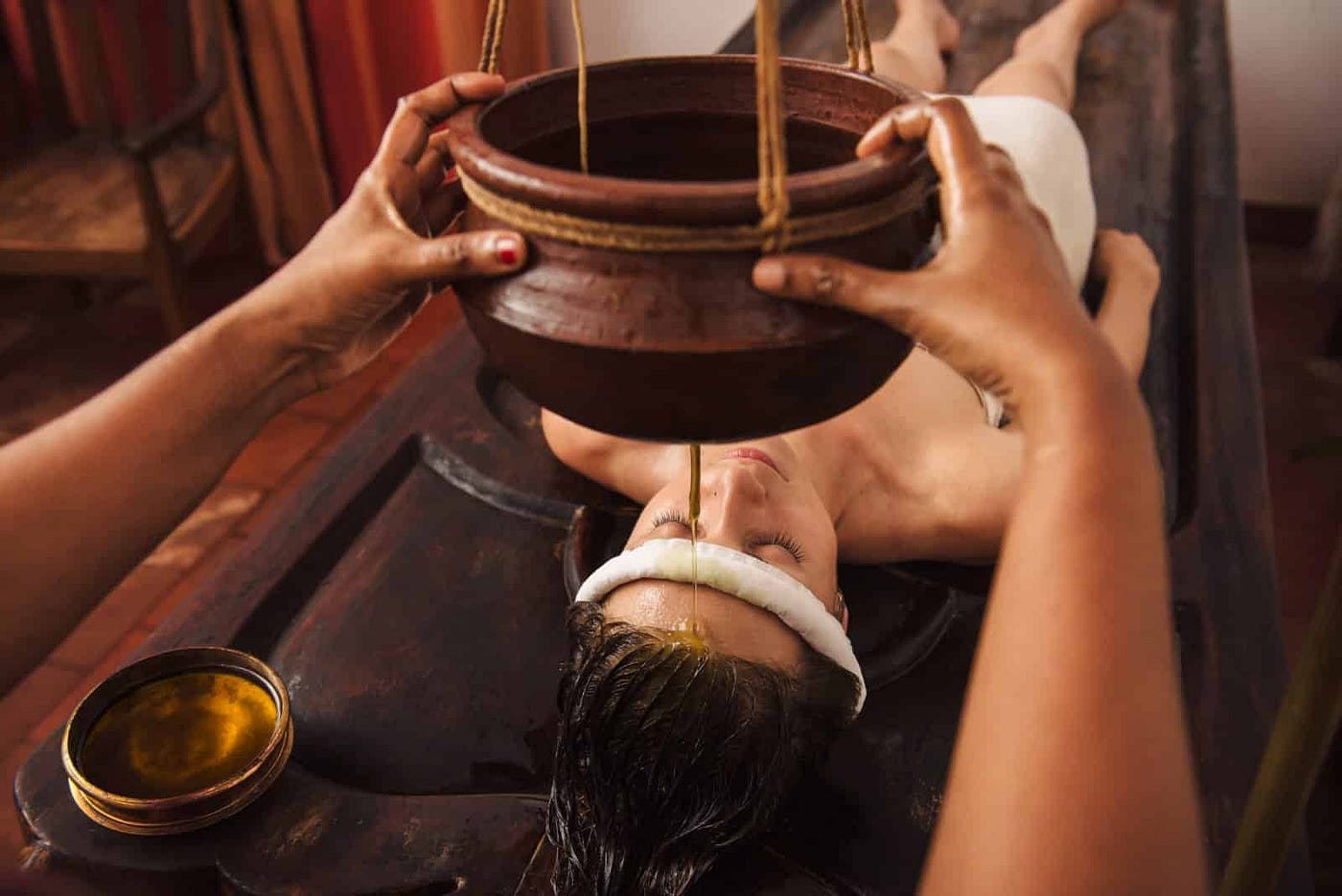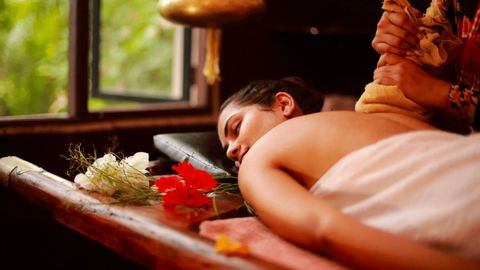Ayurveda (a Sanskrit word that means "science of life" or "knowledge of life") is one of the world's oldest whole-body healing systems. It was developed more than 5,000 years ago in India. Ayurveda is based on the belief that health and wellness depend on a delicate balance between the mind, body, spirit, and environment. The main goal of ayurvedic medicine is to promote good health and prevent, not fight, disease. But treatments may be geared toward specific health problems.
Ayurveda is one of the oldest holistic healing systems in the world. It suggests that your health is based on the balance between your mind, body, spirit, and environment.
Ayurveda is based on the theory that everything in the universe – dead or alive – is connected. If your mind, body, and spirit are in harmony with the universe, you have good health. When something disrupts this balance, you get sick. Among the things that can upset this balance are genetic or , injuries, climate and seasonal change, age, and your emotions. Those who practice ayurveda believe every person is made of five basic elements found in the universe: space, air, fire, water, and earth. These elements combine in the human body to form three life forces, or energies, called doshas. These doshas control how your body works. They are vata dosha (space and air); pitta dosha (fire and water); and kapha dosha (water and earth). Everyone inherits a unique mix of the three doshas. But one is usually stronger than the others. Each one controls a different body function. It’s believed that your chances of getting sick – and the health issues you develop – are linked to the balance of your doshas.
Those who practice ayurveda believe this is the most powerful of all three doshas. It controls very basic body functions, like how cells divide. It also controls your mind, breathing, blood flow, and ability to get rid of waste through your intestines. Things that can disrupt it include eating again too soon after a meal, fear, grief, and staying up too late.
If vata is your dominant dosha, you may be smart, creative, vibrant, and your moods change quickly. Physically, you may be thin and lose weight easily, and are usually cold. When you are out of balance, you can get overstimulated and have anxiety, phobias, and be forgetful. You can also be more likely to have conditions like asthma, heart disease, skin problems, and rheumatoid arthritis. In ayurveda, like increases like. For this dosha (space and air), you can balance out too much vata by doing things that are grounding like meditation, massage, keeping a regular sleep and wake schedule, and eating warm, mild foods.
This energy controls your digestion, metabolism (how well you break down foods), and certain hormones that are linked to your appetite. Things that can disrupt pitta are eating sour or spicy foods, spending too much time in the sun, and missing meals. If you are pitta dominant, then you may be goal-oriented, competitive, confident, and a natural leader. Physically, you may have a medium-sized, muscular build and tend to be hot most of the time. When out of balance, you can be too competitive, cranky, quick to anger, and impulsive. If pitta is your main dosha, you’re thought to be more likely to have conditions like Crohn’s disease, heart disease, indigestion, and fever when you are out of balance. To bring pitta (fire and water) back into balance, you can focus on things that are cooling and light, like salads, cucumbers, and practicing moderation and slow or restorative yoga.
Kapha dosha is thought to control muscle growth, body strength and stability, weight, and your immune system. Things that can disrupt kapha include daytime naps, eating too many sweet foods, and eating or drinking things that contain too much salt or water. If kapha is your main dosha, you may like routine, stick to expectations, and be accepting, calm, and patient. Physically, you are more likely to have a broad frame and easily gain weight. When out of balance, you can easily get fatigued, avoid taking on new projects, and be possessive, stubborn, and depressed. If you are kapha dominant, you may be more likely to develop asthma and other breathing disorders, cancer, diabetes, nausea after eating, and obesity. To reduce excess kapha (earth and water) and be more balanced, you can increase the amount of fruits and vegetables in your diet, and do exercise that gets the blood flowing like jogging or sun salutations
An ayurvedic practitioner will create a treatment plan specifically designed for you. They’ll take into account your unique physical and emotional makeup, and your primary and secondary doshas. They will use that information to work toward the goal of treatment, which is to bring your mind and body into balance. There are several tools used in ayurvedic medicine to help you create harmony, avoid disease, and treat conditions you may have. These include:
A key component of ayurveda, it's used in different combinations, depending on your dosha, and includes licorice, red clover, ginger, and turmeric.
Also known as panchakarma, these are used to cleanse your body of undigested food through practices like blood purification, massage, medical oils, herbs, enemas, and laxatives.
Your practitioner will help you understand your dosha, how it impacts your life, and how you can change your lifestyle to create more balance and harmony. Other treatments used in ayurveda include oil, breathing-exercises (known as pranayama), and repeating mantras, or phrases.
Practicing the system of Ayurveda through a qualified Ayurvedic doctor can lead to benefits ranging from balancing hormones, healthier skin, reduced bloating, curing insomnia and more.
India is an established medical tourism destination, already serving thousands of medical tourists worldwide, including and not limited to Nepal, Afghanistan, Bangladesh, Iran, Iraq, Yemen, Kenya and Nigeria.
More recently, India is being promoted as a cultural and wellness tourism destination to meet the rising demand for wellness tourism from Europe and Asia. India’s ancient healing practices, yoga, naturopathy, and Ayurvedic treatments offer attractive options for European tourists seeking a wellness vacation.
Ayurveda has a growing influence on holistic healthcare and wellness tourism. The Global Ayurvedic Market has been growing at an average annual rate of 16.2% since 2015, reflecting the rising demand for alternative medicine and wellness experiences.
In India, Ayurveda is practiced daily and is part of the fabric of the nation. The emergence of Ayurveda Centres with international certifications of quality practice is fuelling the growth of medical and wellness tourism in the country.
Several Ayurveda schools established in the late 1940s have trained a large pool of highly qualified doctors.
Ayurveda treatment and massage packages offer great value for money for wellness tourists. They are attracting large numbers of Western and Gulf medical tourists to the country every year.
Ayurveda has established India as a genuinely world-class medical and wellness destination. The country is well positioned to benefit from the expected rise in demand for wellness retreats after the pandemic.



Copyrights © 2024 Royal World Trave, India. All Rights Reserved